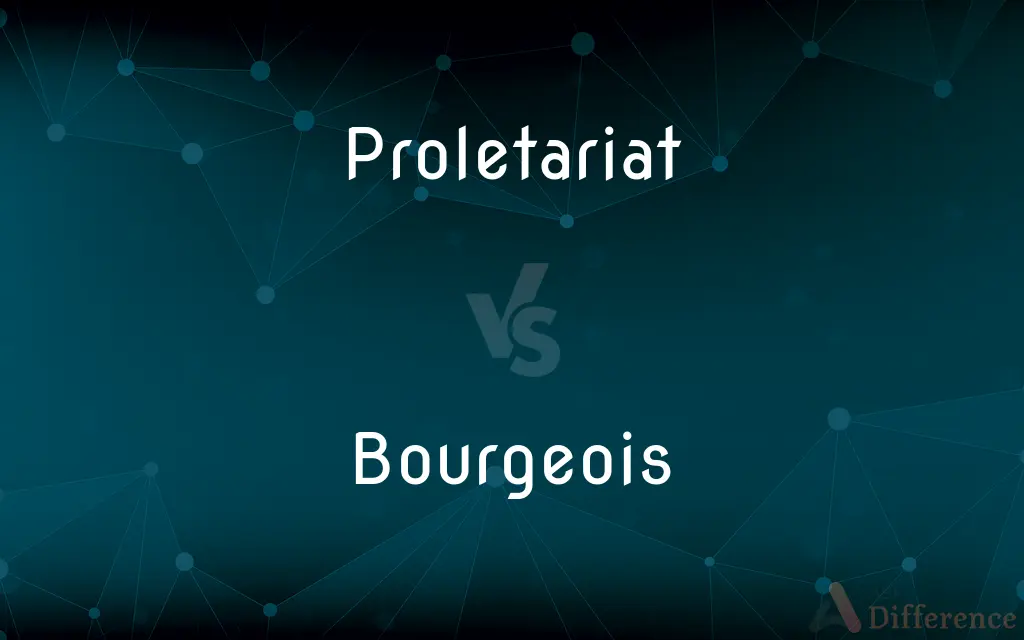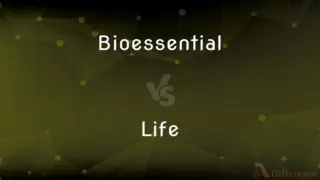Proletariat vs. Bourgeois — What's the Difference?
By Maham Liaqat & Urooj Arif — Updated on March 7, 2024
Proletariat refers to the working class, while Bourgeois denotes the capitalist class owning production means.

Difference Between Proletariat and Bourgeois
Table of Contents
ADVERTISEMENT
Key Differences
The proletariat is defined as the class of workers who do not own the means of production and must sell their labor to survive. On the other hand, the bourgeois refers to the capitalist class that owns the means of production, such as factories and land, and employs labor to generate profit.
The struggle between the proletariat and the bourgeois has been central to Marxist theory, which posits that the exploitation of the working class by the capitalist class is the driving force behind the class struggle and eventual societal change. Whereas the bourgeois class seeks to maximize profits and maintain its economic dominance, the proletariat's interests lie in improving working conditions and gaining a larger share of the economic pie.
The proletariat typically includes factory workers, manual laborers, and low-wage earners who are dependent on their jobs for their livelihood. In contrast, the bourgeois class comprises business owners, investors, and high-level managers who control the means of production and, by extension, the labor market.
In terms of political representation, the proletariat is often associated with movements and parties advocating for workers' rights, social welfare, and the redistribution of wealth. Meanwhile, the bourgeois class tends to support policies and political frameworks that protect private property rights, free markets, and the accumulation of capital.
The dynamics between the proletariat and the bourgeois reflect broader socio-economic tensions within capitalist societies, highlighting issues of inequality, labor rights, and the distribution of wealth. However, the complexity of modern economies and the emergence of new social classes have somewhat blurred the traditional boundaries between these two groups.
ADVERTISEMENT
Comparison Chart
Definition
Working class, does not own production means
Capitalist class, owns production means
Economic Role
Sells labor to survive
Employs labor, generates profit
Historical Context
Subject to exploitation, seeks better conditions
Seeks to maintain dominance, maximize profits
Typical Members
Factory workers, manual laborers
Business owners, investors
Political Interests
Workers' rights, wealth redistribution
Property rights, free markets
Compare with Definitions
Proletariat
Often represented by unions and socialist parties.
Unions have historically defended the rights of the proletariat.
Bourgeois
Benefits from capital accumulation and market dominance.
The bourgeois class expands its wealth through investments.
Proletariat
Historically exploited by capital owners.
The exploitation of the proletariat has been a driving force in social movements.
Bourgeois
Typically supports conservative or capitalist policies.
The bourgeois often funds political campaigns that favor free markets.
Proletariat
Seeks to improve working conditions and wages.
The proletariat's struggle is for fair employment terms.
Bourgeois
Seen as the driving force behind economic inequality.
The wealth of the bourgeois grows at the expense of the proletariat.
Proletariat
Lives paycheck to paycheck, vulnerable to economic shifts.
The recession hit the proletariat the hardest.
Bourgeois
Employs the working class, controlling wages and conditions.
The bourgeois decides on the wages for their employees.
Proletariat
The class dependent on selling their labor to live.
The proletariat rallied for higher wages.
Bourgeois
The class that owns the means of production.
The bourgeois profits from the labor of workers.
Proletariat
The proletariat ( from Latin proletarius 'producing offspring') is the social class of wage-earners, those members of a society whose only possession of significant economic value is their labour power (their capacity to work). A member of such a class is a proletarian.
Bourgeois
A person belonging to the middle class.
Proletariat
The class of industrial wage earners who, possessing neither capital nor production means, must earn their living by selling their labor.
Bourgeois
A person whose attitudes and behavior are marked by conformity to the standards and conventions of the middle class.
Proletariat
The lowest class of society; also, the lower classes of society generally; the masses.
Bourgeois
In Marxist theory, a member of the property-owning class; a capitalist.
Proletariat
The poorest class of working people.
Bourgeois
Of, relating to, or typical of the middle class, especially in holding conventional attitudes and materialistic values.
Proletariat
The propertyless class of ancient Rome, constituting the lowest class of citizens.
Bourgeois
Of or relating to the middle class, their presumed overly conventional, conservative, and materialistic values.
Bourgeois opinion
Proletariat
(Marxism) Wage earners collectively, excluding salaried workers; people who own no capital and depend on their labour for survival; the working class, especially when seen as engaged in a class struggle with the t=the capital-owning class.
Bourgeois
(historical) Of or relating to the bourgeoisie, the third estate of the French Ancien Regime.
Proletariat
The lowest class of citizens, who had no property and few rights, and were regarded as contributing only their offspring to the state.
Bourgeois
(Marxism) Of or relating to the capitalist class, the capitalist exploitation of the proletariat.
Proletariat
The indigent class in the State; the body of proletarians.
Bourgeois
The middle class.
Proletariat
A social class comprising those who do manual labor or work for wages;
There is a shortage of skilled labor in this field
Bourgeois
(rare) An individual member of the middle class.
Bourgeois
A person of any class with bourgeois (i.e., overly conventional and materialistic) values and attitudes.
Bourgeois
(history) An individual member of the bourgeoisie, the third estate of the French Ancien Regime.
Bourgeois
(Marxism) A capitalist, an exploiter of the proletariat.
Bourgeois
A size of type between brevier and long primer, standardized as 9-point.
Bourgeois
(transitive) To make bourgeois.
Bourgeois
A size of type between long primer and brevier. See Type.
Bourgeois
A man of middle rank in society; one of the shopkeeping class.
Bourgeois
Characteristic of the middle class, as in France.
Bourgeois
A capitalist who engages in industrial commercial enterprise
Bourgeois
A member of the middle class
Bourgeois
(according to Marxist thought) being of the property-owning class and exploitive of the working class
Bourgeois
Conforming to the standards and conventions of the middle class;
A bourgeois mentality
Bourgeois
Belonging to the middle class
Common Curiosities
What is the proletariat?
The proletariat refers to the working class that sells their labor to live, not owning the means of production.
Can individuals be part of both the proletariat and bourgeois?
Traditionally, no, but modern economic complexities have blurred these distinctions for some individuals.
What is the main difference between the proletariat and the bourgeois?
The main difference lies in their relation to the means of production: the proletariat sells labor, while the bourgeois owns production means.
How do the proletariat and bourgeois differ in political interests?
The proletariat generally supports workers' rights and wealth redistribution, whereas the bourgeois favors policies protecting capital accumulation.
How do modern economies affect the class distinctions between proletariat and bourgeois?
The emergence of new social classes and economic structures has complicated traditional class distinctions.
Are the terms proletariat and bourgeois still relevant today?
Yes, they remain relevant in discussions on socio-economic inequality and class dynamics, although the contexts may have evolved.
Who are the bourgeois?
The bourgeois are the capitalist class owning the means of production and employing the proletariat.
Why is the struggle between the proletariat and bourgeois significant?
This struggle is central to Marxist theory, highlighting the societal impact of class exploitation and economic inequality.
Can the relationship between the proletariat and bourgeois change?
Yes, societal and economic reforms can alter this relationship, potentially reducing exploitation and inequality.
What historical movements have been influenced by the proletariat?
Numerous labor and socialist movements worldwide have been driven by the interests of the proletariat.
How does globalization impact the proletariat and bourgeois?
Globalization can exacerbate inequalities, affecting the proletariat through job insecurity and the bourgeois by expanding market dominance.
What impact does technological advancement have on these classes?
Technological advancements can displace proletarian jobs while creating new wealth for the bourgeois, further affecting class dynamics.
How does education affect one's class position between the proletariat and bourgeois?
Education can offer upward mobility, potentially shifting individuals from the proletariat to higher economic classes, though systemic barriers remain.
What role do unions play in the proletariat's struggle?
Unions play a crucial role in advocating for workers' rights and better conditions for the proletariat.
What is the future of the class struggle between the proletariat and bourgeois?
The future depends on socio-economic policies, technological developments, and the ongoing fight for equity and workers' rights.
Share Your Discovery

Previous Comparison
Barry vs. Larry
Next Comparison
Bioessential vs. LifeAuthor Spotlight
Written by
Maham LiaqatCo-written by
Urooj ArifUrooj is a skilled content writer at Ask Difference, known for her exceptional ability to simplify complex topics into engaging and informative content. With a passion for research and a flair for clear, concise writing, she consistently delivers articles that resonate with our diverse audience.















































